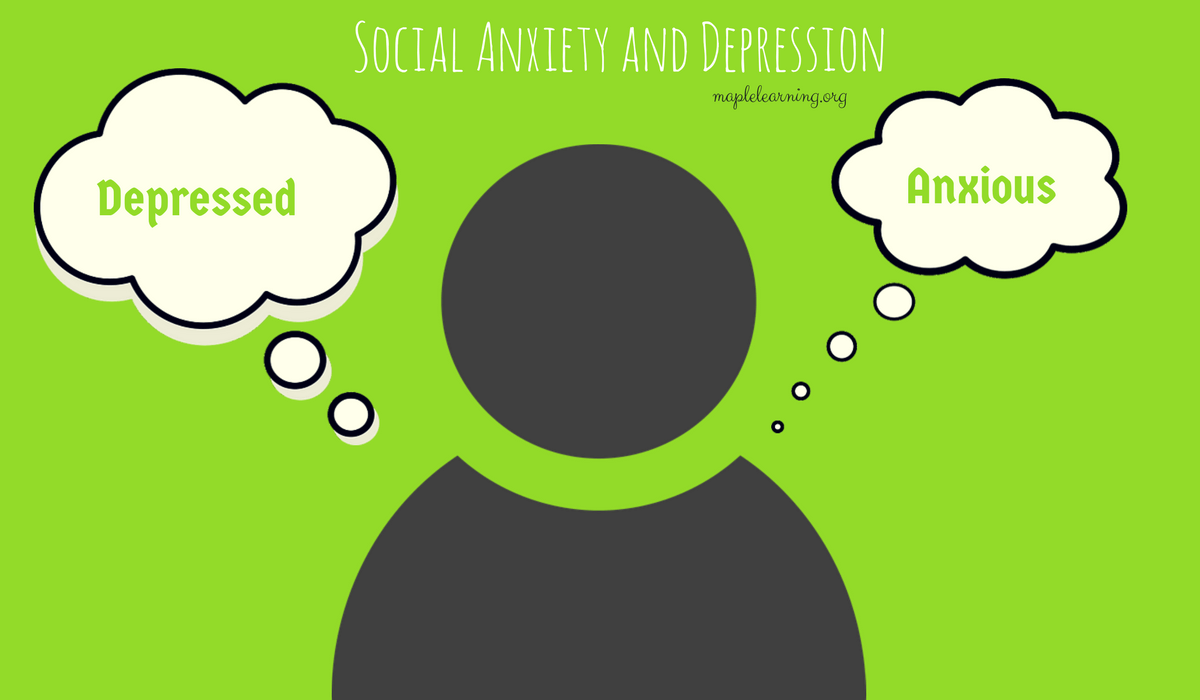Social Anxiety and Depression Among College Students
 Social anxiety and depression Social anxiety is prevalent among college students, and it’s one of many mental health issues that affect college students. Anxiety always gets in the way of students’ life. Many students feel overwhelmed with academic pressure, family and social pressure that affect their mental being. Anxiety is also one of the contributing factors to depression.
Social anxiety and depression Social anxiety is prevalent among college students, and it’s one of many mental health issues that affect college students. Anxiety always gets in the way of students’ life. Many students feel overwhelmed with academic pressure, family and social pressure that affect their mental being. Anxiety is also one of the contributing factors to depression.
Symptoms and signs of social anxiety
Social anxiety is more than just feeling shyness. Social anxiety can interfere with an individual’s daily routine. According to Mayo Foundation for Medical Education and Research (MFMER), symptoms and signs of social anxiety include but not limited to:1
Emotional and behavioral symptoms
- Fear of situations or being judged
- Worrying about embarrassing oneself
- Concern for offending someone else
- Intense of fear of interacting or talking with strangers
- Fear of people that may notice that the person look anxious
- fear of physical symptoms that cause a person feel embarrassed such as blushing, sweating, trembling or having a shaky voice
- Avoiding doing things or speaking to people out of fear of embarrassment
- Avoiding situations that make the person the center of attention
- Having anxiety in anticipation of a feared activity or event
- Spending too much time analyzing one’s performance after a social situation
- Expecting the worst possible consequences from a negative experience during a social situation
Physical symptoms
- Fast heartbeat
- Upset stomach or nausea
- Trouble catching breath
- Dizziness or lightheadedness
- Confusion or feeling “out of a body.”
- Diarrhea
- Muscle tension
Symptoms or signs of depression
Depression is one of the prevalent problems among college students. Recognizing the signs and symptoms of depression is the first step in helping an individual identify when to seek help from mental health professionals. Katherine C. Nordal, Ph.D., APA Executive Director for Professional Practice, explains the symptoms and sign of depressions include but not limited to:2
- Physical well-being signs: Changes in sleep habits such as sleeping more than the person normally do, difficulty falling asleep or staying asleep during the night, or wake up but feel unrested. Appetite changes such as a loss of appetite or overeating.
- Emotional signs such as feeling sadness, feeling of being overwhelmed, feelings of hopelessness, and feelings of powerlessness.
- Thinking symptoms such as seeing a glass ‘half-empty’ or ‘half-full,’ having concentration difficulty and paying attention which resulting in difficulty accomplishing work tasks.
If you know and experience any of these symptoms, you may have depression. Don’t hesitate to seek help from mental health professionals.
Contributing factors
Students face a variety of problems in college especially during a college transition where they “experience many firsts, including new lifestyle, friends, roommates, exposure to new cultures and alternate ways of thinking,” said Hilary Silver, M.S.W., a licensed clinical social worker and mental health expert for Campus Calm.3 As a result, they are prone to stress that contribute to the risk of developing clinical depression and anxiety.
Causes of depression
Depression is a complex disease. It is difficult to determine the underlining cause of depression. There is more to it than just a result of a chemical imbalance. Research suggests that “depression doesn’t spring from simply having too much or too little of certain brain chemicals. Rather, there are many possible causes of depression, including faulty mood regulation by the brain, genetic vulnerability, stressful life events, medications, and medical problems.” 4 Scientists continue to research and learn more about the biology of depression in the hope that they will be able to find a cure or a way to make better treatments that suit each individual.
Get help when needed
It is important for students who experience living with anxiety and depression to seek help from mental health professionals immediately in spite of the long wait times. College and university mental health services may not be perfect yet, but at least the help is available to those who need.
Sources:
[1] Mayo Clinic Staff. (n.d.). Social anxiety disorder (social phobia). Mayo Foundation for Medical Education and Research. Retrieved from http://www.mayoclinic.org/diseases-conditions/social-anxiety-disorder/basics/symptoms/con-20032524
[2] Nordal, K.C. (2013, July 24). Recognizing the signs and symptoms of depression. American Psychological Association. Retrieved from http://www.apa.org/helpcenter/symptoms-of-depression.aspx
[3] Tartakovsky, M. (2016). Depression and Anxiety Among College Students. Psych Central. Retrieved on July 15, 2017, from https://psychcentral.com/lib/depression-and-anxiety-among-college-students/
[4] What causes depression?. (2017, April 11). Harvard Health Publications. Retrieved from http://www.health.harvard.edu/mind-and-mood/what-causes-depression


